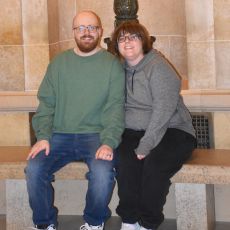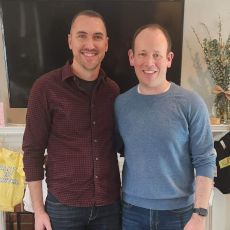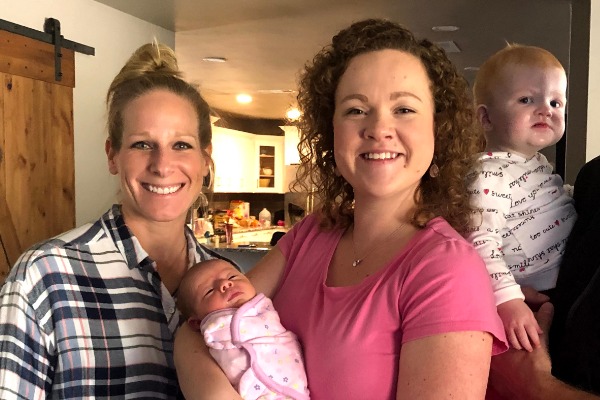5 Ways Cope after You Place Your Child for Adoption

Even if you know that adoption was the best decision for your older child, it doesn’t mean you’ll immediately bounce right back to feeling like yourself again. If you need immediate support, call 1-800-ADOPTION now.
For birth mothers like Brittnee, adjusting to post-adoption life took some time:
“I remember sobbing all over the poor nurse assigned to me after they’d gone. Even then, in that moment, I knew it was the right choice. I knew that she would have everything I knew she deserved. She would have amazing opportunities for education, she would have a loving and devoted family and be able to travel and see this amazing world we live in. I would be able to be a part of her life in a small and distant way, which made it bearable.”
For many women, it’s common for feelings of grief and loss to ebb and flow after adoption. This can be both confusing and frustrating to deal with as you try to adjust to your new normal.
After putting so much hard work into creating a better future for your child, there’s probably one big question on your mind: “How can I cope with placing my child up for adoption?”
Below, we’ve come up with 5 tips that can help you on your healing journey. Right now, you’re struggling with a lot of complex emotions about placing your older child up for adoption. So, if you ever need anyone to talk to, please don’t forget that you can always reach out to our free information line at 1-800-ADOPTION to speak with one of our specialists.
Meanwhile, here are some useful tools that you can use as you get back on your feet after placing an older child for adoption:
1. Create a Healthy Space for Healing
It’s difficult to start the healing process while living in the same space where you spent all your time raising, protecting and caring for your child. When you see everything that reminds you of them daily, it can be incredibly difficult to move forward.
If you’ve just completed your adoption, it may be too difficult to imagine your child’s room as anything other than their “space.” But when you’re ready, you might start identifying what the potential triggers are that remind you of your child.
Eventually, you’ll be able to decide if you need to change their room from a nursery to something else, giving more of their toys to the adoptive family and your child, and anything else to try and create a new normal.
2. Reach Out to Your Support System
One of the best things that you can do is reach out to those that care about you.
As you start to process your grief, it can be all too easy to isolate yourself. However, doing so will only make it harder to heal.
If you start to feel alone, consider reaching out to:
- A dear family member
- A close friend
- A compassionate adoption specialist
- A counselor or therapist who is familiar with the emotions of adoption
- Other birth parents
Reaching out to someone for help can feel uncomfortable and vulnerable at first. But the people who care about you only have your best interests at heart. Please remember that there are also adoption specialists here to listen if you ever need a safe place to vent or a shoulder to lean on.
When Lindsey remembers her adoption experience, one of the things that stick out to her is the support she received from her birth parent specialist:
“She [Shannon, her birth parent specialist] was there for me when I didn’t have anybody, and she always knew just what to say,” Lindsey remembered. “I did have a lot of concerns and fears, and she knew how to talk me through them. She’s someone that’s — even now, three months after I’ve had my baby — probably going to check in on me from time to time. She was just amazing, and I’m so glad that she’s in my life.”
Our specialists can offer the same amount of support, encouragement and dedication for you, too. Whenever you need someone to talk to, we are available 24/7 at 1-800-ADOPTION.
3. Practice self-care
A little bit of self-care can go a long way.
When you’re busy parenting, your time is filled up with taking care of your child. But, when you’re no longer the primary caregiver, it’s easy for those feelings of grief and loss to seep in. Instead, finding new, healthy ways to cope can help you get back to feeling like yourself again.
When you’re tired, don’t keep pushing yourself to take on more than you can. You deserve to rest and a safe space to heal.
- Try to keep eating on your normal schedule and to stay hydrated
- Exercise if you can
- Get outside for some sunshine at least once a day
- Focus on hobbies and interests that you’ve always found joy in
A good book, a favorite movie, or even just giving yourself a break when you need it are some great ways to take care of yourself.
4. Acknowledge your feelings
Right now, it might feel like you’re the only one who knows what you're going through. But the truth is that what you’re feeling is completely normal. And there are plenty of birth parents who have placed an older child up for adoption and know what it’s like in your shoes.
When Casey found out she was unexpectedly pregnant with twins she knew that she had to give her children a better life:
“I didn’t have family support… everything was on my own,” she said. “I was just contemplating, ‘What can I possibly do now that would make a difference for our future and provide my sons with the life that I would like to give them?’”
Even so, that doesn’t mean the adoption wasn’t emotionally challenging for her, too.
We know that you’re in a difficult place right now. But it’s important that you don’t try to bottle everything up and that you don’t keep letting yourself feel guilty about your emotions.
You don’t have to force yourself to feel better when you’re not. Be gentle with yourself as you start to get used to your new normal.
5. Find the positive side of your adoption decision (while accepting your sadness)
For many women, knowing that they still play an important role in their child’s life helps tremendously with feelings of grief and loss. Knowing that your child is safe and cherished by a family who loves them dearly can make it easier to cope with your adoption decision.
When Caitlin thinks about her adoption, she thinks about how thankful she is for her open adoption:
“Knowing that I can be around and be there — I don’t even know how to put it into words… I’m like a cheerleader on the sideline, and that’s more than I could have asked for,” she said of her open adoption relationship. “He gets this family who can take care of him and do everything I couldn’t, but he can also know that I didn’t just give him away. I had a purpose for him, and it was meant to be.”
Knowing that you were the one who made such an important decision should feel empowering. Because you didn’t “give up” when you choose adoption. You gave them a beautiful future full of love and countless opportunities.
Disclaimer
Information available through these links is the sole property of the companies and organizations listed therein. American Adoptions provides this information as a courtesy and is in no way responsible for its content or accuracy.






































